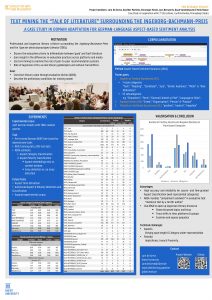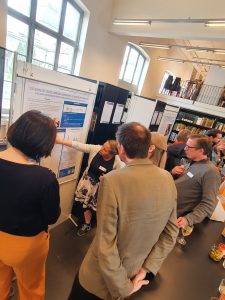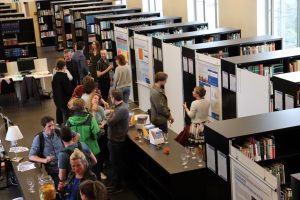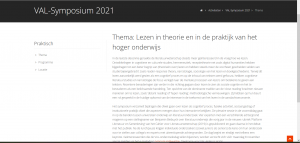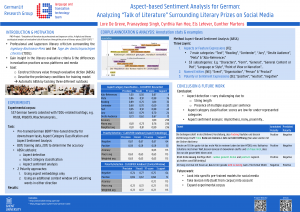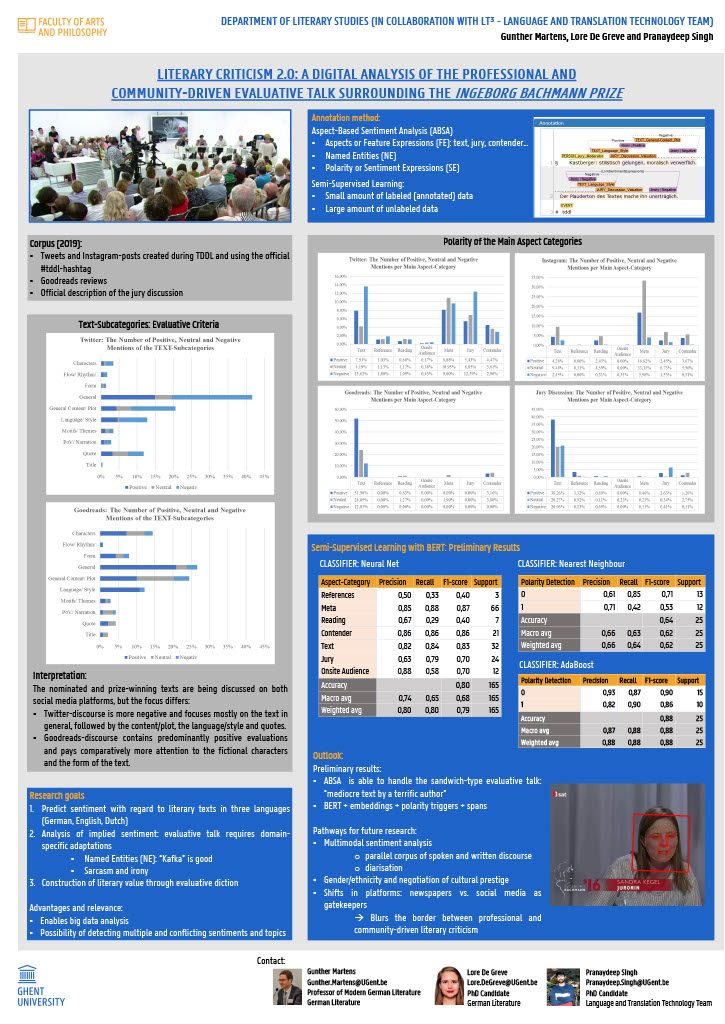On the 3rd of June 2021, we presented our poster on “Literary criticism 2.0: A Digital Analysis of the Professional and Community-Driven Evaluative Talk of Literature Surrounding the Ingeborg Bachmann Prize” at the DH Benelux conference. If you are interested, you can read our abstract below and view our poster (more clearly) by clicking on the following link: DHBenelux21-poster-GM-LDG.
“Literary criticism 2.0: A Digital Analysis of the Professional and Community-Driven Evaluative Talk of Literature Surrounding the Ingeborg Bachmann Prize”
In recent times, the knowledge of a limited number of professional literary critics has been challenged by technological developments and the “wisdom of the crowds”. Ample research has been devoted to shifts in traditional gatekeepers, such as hybrid publishers (Vandersmissen 2020) and prizes (English 2009, Sapiro 2016), and to the demise of professional critics’ authority at the hands of online literary criticism (Dorleijn et al. 2009, Löffler 2017, Schneider 2018; Kempke et al. 2019, Chong 2020). Nevertheless, comparatively little research (Allington 2016, Kellermann et al. 2016; Kellermann and Mehling 2017; Bogaert 2017, Pianzola et al. 2020) has actually attempted to directly ingest and mine the content of user-generated online literary criticism, as well to examine and the role of peer-to-peer recommendation systems and layperson critics as new literary gatekeepers and cultural transmitters. This project aims to study the differences between professional critics and this ‘wisdom of the crowd’, especially since traditional gatekeepers of the literary field (publishers, reviewers) are increasingly trying to tap the potential of online reading communities.
We will present the preliminary results of the FWO-funded research project “Evaluation of literature by professional and layperson critics. A digital and literary sociological analysis of evaluative talk of literature through the prism of literary prizes (2007-2017)” (2019-2023), which compares, analyses and mines the evaluative “talk of literature” of both professional and layperson critics surrounding six prominent literary prizes in three different languages. In this poster presentation we will present the tools used to examine the professional and layperson literary criticism pertaining to the German-language Ingeborg-Bachmann-Preis and the Tage der deutschsprachigen Literatur[1] (TDDL). During the “Days of German-Language Literature”, all nominated contenders read an unpublished narrative text in front of a live (television) audience. This text is discussed and criticised by the professional jury in the presence of the author and the live audience, but increasingly so also by an online audience reacting, under the #tddl-hashtag, both to the literary text and its discussion by the official jury.
Our aim is to gain insight into the evaluative criteria used by both professional and layperson critics to tell ‘good’ from ‘bad’ literature, as well as to engage with the differences in evaluation practices across platforms and media. In order to do this, we perform a fine-grained aspect-based sentiment analysis on an annotated corpus consisting of the official jury discussion, posts mentioning the TDDL on two social media platforms, namely Twitter and Instagram, as well as reviews of the nominated texts on the literary peer-to-peer book recommendation platform Goodreads. This will allow us to detect which sentiments are being expressed about a certain “aspect” or topic (e.g. contender, nominated book, jury etc.) on a specific medium and by whom, thus allowing us to study the similarities and differences between the literary criticism of professional critics and the ‘crowds’. We mainly discuss the results of this annotation as well as the annotation system itself and the technical challenges raised by the project. Given that the project comprises literary prizes in three different languages, internal development is currently under way for Dutch and German sentiment mining. Whereas English sentiment and opinion can be dealt with through BERT-based models out of the box, it has proven less reliable with regard to our German corpus.
Bibliography:
Allington, Daniel. “‘Power to the reader’ or ‘degradation of literary taste’? Professional critics and Amazon customers as reviewers of The Inheritance of Loss.” Language and Literature, vol. 25, no. 3, 2016, pp. 254–278.
Bogaert, Xiana. “‘ICH WÜRDE AM LIEBSTEN MIT DER JURY DISKUTIEREN! #TDDL’ – Der Ingeborg-Bachmann-Preis: ein Vergleich zwischen der Jury- und Laienkritik auf Twitter.” 2017. Ghent University, unpublished thesis.
Chong, Philippa K.. Inside the Critics’ Circle: Book Reviewing in Uncertain Times. Princeton University Press, 2020.
Dorleijn, Gillis J., et al.. Kritiek in crisistijd: Literaire kritiek in Nederland en Vlaanderen tijdens de jaren dertig. Vantilt, 2009.
English, James F.. The Economy of Prestige: Prizes, Awards, and the Circulation of Cultural Value. Harvard University Press, 2009.
Kellermann, Holger, and Mehling, Gabriele. “Laienrezensionen auf amazon.de im Spannungsfeld zwischen Alltagskommunikation und professioneller Literaturkritik.” Die Rezension: Aktuelle Tendenzen der Literaturkritik, edited by Andrea Bartl and Markus Behmer, Königshausen und Neumann, 2017, pp. 173-202.
Kellermann, Holger, et al.. “Wie bewerten Laienrezensenten? Ausgewählte Ergebnisse einer inhaltsanalytischen Studie.” Was wir lesen sollen: Kanon und literarische Wertung am Beginn des 21. Jahrhunderts, edited by Stefan Neuhaus and Uta Schaffers, Königshausen und Neumann, 2016, pp. 229-238.
Kempke, Kevin, et al.. Institutsprosa: Literaturwissenschaftliche Perspektiven auf akademischen Schreibschulen. Leipzig, Spector Books, 2019.
Löffler, Sigrid. “Danke, kein Bedarf? Wie die totgesagte Literaturkritik ihr Ableben überleben kann.” Stimmen der Zeit. – Freiburg, Br.: Herder, vol. 235, no. 12, 2017, pp. 805–814.
Pianzola, Federico, et al.. “Wattpad as a Resource for Literary Studies. Quantitative and Qualitative Examples of the Importance of Digital Social Reading and Readers’ Comments in the Margins.” PLOS ONE, vol. 15, no. 1, 2020. https://doi.org/10.1371/journal.pone.0226708.
Sapiro, Gisèle. “The Metamorphosis of Modes of Consecration in the Literary Field: Academies, Literary Prizes, Festivals.” Poetics, vol. 59, 2016, pp. 5–19.
Schneider, Ute. “Bücher zeigen und Leseatmosphären inszenieren – vom Habitus enthusiastischer Leserinnen und Leser.” Gelesene Literatur: Populäre Lektüre im Zeichen des Medienwandels, edited by Steffen Martus and Carlos Spoerhase, Edition Text+Kritik, 2018, pp. 113-123.
Vandersmissen, Robbe. “Skepp O’hoi. En upptäcktsresa till uppkomsten av hybridförlag i bokens nya värld”. 2020. Ghent university, unpublished thesis.
